India’s External Affairs Minister S Jaishankar on Tuesday declared India a "Vishwa Mitra", a friend of the world, that will be a bridge-builder, but will also challenge the power structure and give voice to South as it claims its due.
"When we aspired to be a leading power, this is not for self-aggrandisement, but to take on greater responsibility and make more contributions," he said at the high-level meeting of the General Assembly.
"All nations pursue the national interests (but) we, in India, have never seen that as being in contradiction with global good," he said.
Outlining India’s role, he said: "From the era of non-alignment, we have now evolved to that of Vishwa Mitra, a friend to the world.
"This is reflected in our ability to engage with a broad range of nations and when necessary, harmonise interests."
The New Delhi G20 Summit presided over by India "affirms that diplomacy and dialogue are the only effective solutions. The international order is diverse. And we must cater for divergences, if not differences. The days when a few nations set the agenda and expected others to fall in line are over", he said.
"Our vision of ‘One World, One Family, One Future’ sought to focus on the key concerns of the many, not just the narrow interests of a few," he said.
The outcomes of the New Delhi G20 Summit that brought development and restructuring the global financial order to the fore "will surely resonate for years ahead", he asserted.
Of his nation’s future, Jaishankar said: "As a civilisational polity that embraces modernity, we bring both tradition and technology equally confidently to the table. It is this fusion that today defines India that is Bharat.
"India has entered the ‘Amrit Kaal’, a quarter century, where greater progress and transformation awaits us."
"The world saw a glimpse of what is to come when our Chandrayaan 3 landed on the moon," he said.
Jaishankar challenged the existing global power structure as a multipolar world emerges: "The days when a few nations set the agenda and expected others to fall in line are over.
"It is still a few nations who shape the agenda and seek to define the rules. This cannot go on indefinitely, nor will it go unchallenged. A fair, equitable and democratic order will surely emerge once we all put our minds to it."
He said that the way out of this is to find common grounds as was demonstrated at the G20 Summit, where India forged a consensus. "In the words of Prime Minister Narendra Modi, it was to bridge divides, dismantle barriers and sow seeds of collaboration that nourish a world where unity prevails over discord and where shared destiny eclipses isolation," Jaishankar said.
"Finding common ground is an imperative to listen to others and to respect the viewpoints," he said.
"This is not weakness, it is the basics of cooperation. Only then, can collective efforts on global issues be successful."
India’s foreign policy’s evolution from nonalignment to Vishwa Mitra, he said "is reflected in our ability to engage with a broad range of nations and when necessary, harmonise interests".
He cited the examples of the BRICS, where India stands alongside Russia and China, and the multi-national arrangements with the US at the centre. The Vishwa Mitra policy “is visible in the rapid growth of the Quad, a mechanism today so relevant to the Indo-Pacific (of India, the US, Japan and Australia)".
"It is equally apparent in the expansion of the BRICS grouping of independent-minded nations, or in fact, the emergence of the I2U2 (of India, Israel, the US and the UAE) combination," he said.
"Recently, we hosted the creation of the India-Middle East-Europe, economic corridor" that was announced by Prime Minister Narendra Modi and US President Joe Biden at the G20 Summit.
"This willingness to work in an open-minded manner on specific domains is now a defining characteristic of the emerging multipolar order," he said.
Jaishankar did not mention any country by name, although there were general criticisms of the West and a hint to China of India’s commitment with the Quad to a secure, non-hegemonist Indo-Pacific. Nor did he address Russia’s invasion of Ukraine, where India is caught uncomfortably between its historic ties with Mosco and its growing relations with the West based on geopolitical and economic interests. In a glancing reference, he said that "respect for territorial integrity" – often used to criticise Russia’s invasion – should not be determined by "political convenience determines responses to terrorism, extremism and violence. Similarly, respect".
On terrorism, where Pakistan and some other countries subscribe to double standards, he said that political convenience should not determine "responses to terrorism, extremism and violence".
As for “non-interference in internal affairs (it) cannot be exercises in cherry picking," he said. "When reality departs from the rhetoric, we must have the courage to call it out," he said.
Voicing the grievances of the South, he said, “We must never again allow an injustice like vaccine apartheid (when developed countries initially hogged the supply) to recur. Climate action too cannot continue to witness an evasion of historical responsibilities (of industrialised countries that caused the buildup of greenhouse gases)".
Nor, he said, "the power of markets should not be utilised to steer food and energy from the needy to the wealthy" as has happened in the aftermath of the Russian invasion of Ukraine. At the G20 Summit, "we gave voice to an entire continent, which has long been it's due" by admitting the African Union as a permanent member of the G20, he said.
"This significant step in reform should inspire the United Nations, a much older organisation to also make the Security Council contemporary," he said.
"Broad representation is after all, a prerequisite for both effectiveness and credibility."
India can be a model for other developing nations, he said. "Our message to the world is in digitally enabled governance and delivery, in the widening ambit of amenities and services, in rapidly growing infrastructure, and in our energetic startup culture," he said.
"It is visible to you In vibrant cultural expressions, such as in the arts, yoga, wellness and lifestyle," he said.

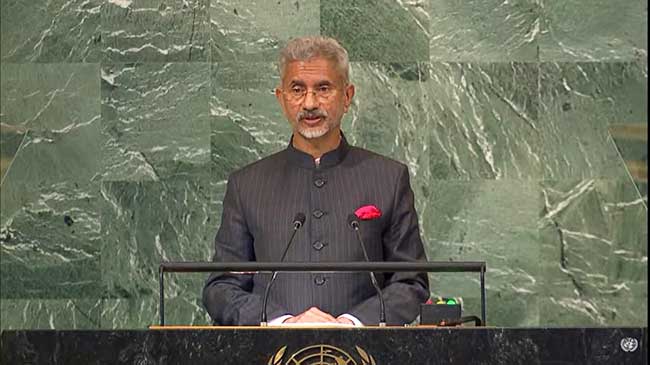
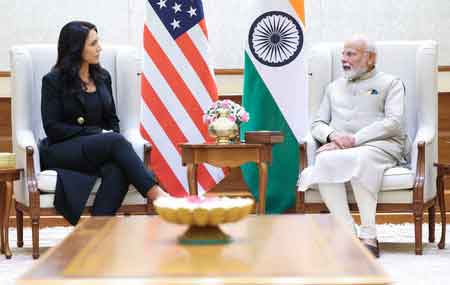
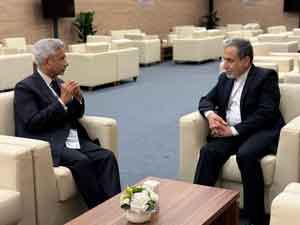
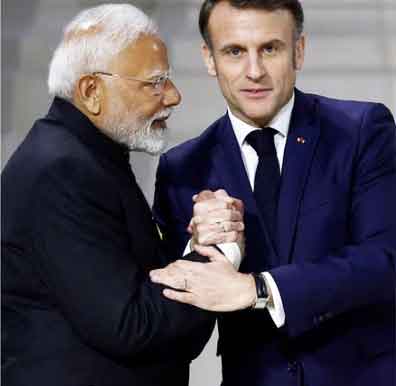
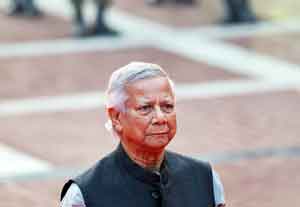


Tripura CM Saha holds key meeting with BJP, IPFT and TMP leaders
Tripura Chief Minister Manik Saha on Friday held an "important" meeting between the leaders of ruling BJP and its two allies – Tipra Motha Party (TMP) and Indigenous People's Front of Tripura (IPFT) and discussed various political and developmental issue, sources said.
HM Amit Shah's meeting sends a clear message: Not a drop of water to Pakistan
A high-level meeting was held on Friday at the residence of Union Home Minister Amit Shah regarding the suspension of the Indus Waters Treaty. The 45-minute meeting between the Home Minister and Union Jal Shakti Minister C.R. Patil focused on exploring ways to halt the flow of water to Pakistan.
Tripura: TMP chief urges Centre to adopt 'stronger policy' against B'desh
Ruling BJP’s ally Tipra Motha Party (TMP) founder-chief Pradyot Bikram Manikya Debbarma on Friday urged the Central government to adopt a stronger policy stance towards Bangladesh, accusing the neighbouring country of encouraging fundamentalist forces targeting Hindu minorities.
Pahalgam attack: More countries express solidarity with India, offer support in fight against terrorism
Ambassadors of Israel, Egypt, Argentina, and Nepal met External Affairs Minister (EAM) S. Jaishankar in New Delhi on Friday, expressing solidarity with India in its fight against terrorism following the heinous terror attack in Pahalgam.
Tripura CM directs SPs and DMs to remain vigilant about Pakistani nationals
Tripura Chief Minister Manik Saha on Friday directed the Superintendents of Police (SPs) of all eight districts to regularly share necessary inputs with the Chief Minister’s Secretariat regarding the presence of any Pakistani nationals in the state, officials said.
US supports India's 'hunt' for those behind 'horrific Islamist terrorist attack' in Pahalgam, says Gabbard
Tulsi Gabbard, Director of National Intelligence (DNI), on Friday said that the United States supports India's "hunt" for the perpetrators of the "horrific Islamist terrorist attack" in Pahalgam that took place earlier this week.
Tehran stands ready to 'forge greater understanding' between India and Pakistan: Iran FM Araghchi
Citing its good relations with both India and Pakistan, Iran on Friday said that it stands ready to "forge greater understanding" between New Delhi and Islamabad following the Pahalgam terror attack, earlier this week.
PM Modi's action will act as deterrent against any fresh attempts to harm India: Tripura CM
Tripura Chief Minister Manik Saha on Friday denounced the Pahalgam terror attack, asserting his staunch belief that Prime Minister Narendra Modi's decisive action will act as a strong deterrent against any future attempts by terrorists to harm India.